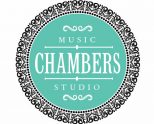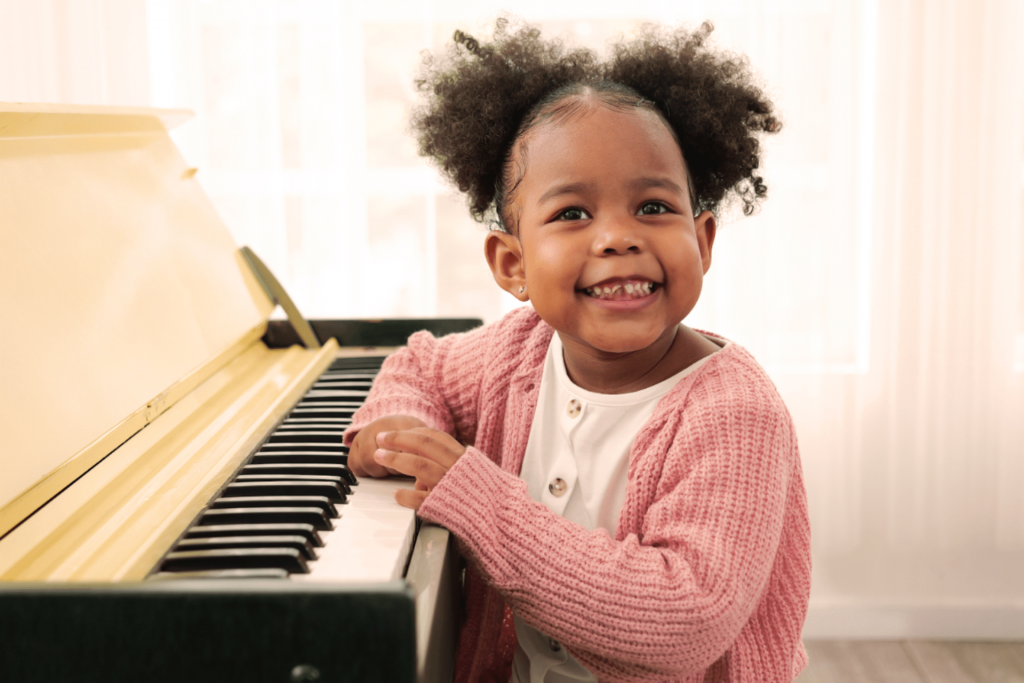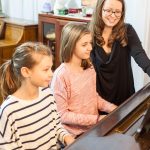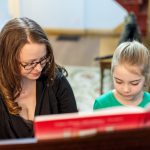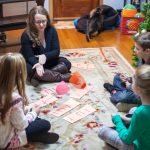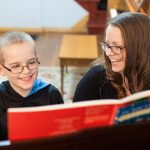You’re sitting on the living room floor with your child and notice how fascinated they are by the sounds they create on a toy piano. Each key press is met with joy and curiosity. And did they just clap on the beat of that song? Wait…
“What’s the best age to start piano lessons?”
“Should I enroll my child now?”
“Can my child handle it?”
Let’s find out!
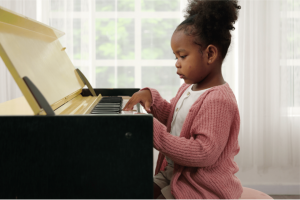
What Is The Best Age To Start Piano Lessons?
The consensus among experts suggests the best age to start piano lessons is between 5 to 9 years old. Children aged 5 to 9 show more physical and cognitive development readiness that will allow them to grasp the fundamentals of music with greater ease.
While children under the age of 6 may show some readiness signs for playing the piano, it’s important to think through the whole picture.
So how can you determine if your child is prepared to start piano lessons? Let’s discuss the readiness signs that could mean your child is ready to start taking piano lessons.
10 Signs Your Child Is The Right Age To Start Piano Lessons
Every parent believes their child could be the next Debussy or Mozart (rumor has it, he started playing piano at age 3!) Maybe your child is the next Jacob Collier, but how will you know? How can you truly assess if your child is ready to start piano lessons?
There are a number of signs that may indicate if your child is ready to hop onto the piano bench. Let’s look into a few.
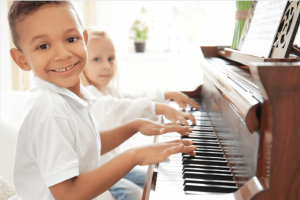
Your child is ready to start piano lessons if:
#1 – They have basic motor skills.
Piano playing requires the ability to press individual keys and often multiple keys with multiple fingers at the same time. That requires a handle on motor skills. If your child isn’t able to pick items up or put individual fingers down, it may be a wee bit early to throw them in front of a piano.
#2 – They are beginning to learn left from right.
A basic understanding of left and right is crucial for learning piano, as it aids in reading music and navigating the keyboard correctly. Piano lessons can help children get a grasp on this concept more quickly!
#3 – They can count to 4.
Mastery in counting to four isn’t just math—it’s rhythm’s backbone in piano music. This skill is essential for interpreting beats and ensuring the music flows beautifully.
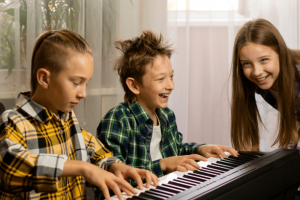
#4 – They are a motivated learner.
A child who shows interest and eagerness in learning is more likely to engage positively with lessons and face challenges with a proactive attitude. Piano requires a lot of practice and eagerness to learn will help them stay excited and passionate about the piano.
#5 – They are working on their focus.
A typical piano lesson is at least 30 minutes long. Your child should be working up to a goal of 30 minutes of true focus.
#6 – They are ready to practice.
Do they love to play, even outside of lessons? Then that’s a good indicator that your child likes playing the piano and they’re willing to put in some extra practice.
#7 – They can follow the instructions.
Being able to listen to and follow the teacher’s guidance is essential for learning and making progress in piano lessons.
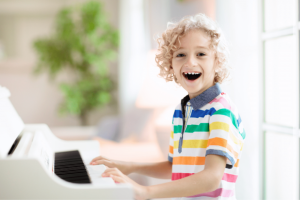
#8 – They are open to feedback.
Learning music requires some feedback; it’s about approaching practice and feedback with an open heart and a ready mind, laying the groundwork for growth and improvement.
#9 – They show signs of basic rhythm.
An innate sense or interest in rhythm helps with learning timing and musicality, which are integral to playing the piano. If rhythm isn’t your child’s thing, no worries! Teaching your child the basics of rhythm is something we’ve got covered.
#10 – They can read basic words.
The ability to read simple words is beneficial for following lesson materials and beginning to read music. Afterall, most music instructions are written!
Benefits of Children Starting Piano Lessons
So you’ve assessed your child’s readiness, but you’ve still got some questions. You’ve heard that piano takes a lot of practice and a good deal of commitment. You’re beginning to wonder if you really want to start your child’s musical career this early.
- Instruments like piano encourage discipline and patience from practicing. Regular practice teaches children discipline and patience, as they learn that hard work and perseverance lead to rewarding outcomes. It also normalizes the concept that working hard and consistently at something is a skill set to be valued.
- Piano lessons enhance cognitive development. Learning piano has been shown to boost children’s cognitive development, enhancing areas such as memory, attention, and problem-solving skills. Regular practice can lead to improved academic performance.
- Playing piano improves fine motor skills and hand-eye coordination. Playing the piano requires precise finger movements and coordination, which significantly enhances fine motor skills and hand-eye coordination, aiding in the development of a child’s overall motor abilities.
- Piano boosts self-esteem and confidence through skill mastery and performance. As children progress and master new pieces, their self-esteem and confidence grow. This sense of achievement encourages them to set and reach new goals.
- Piano lessons provide a sense of achievement and accomplishment. Completing music pieces and performing gives children a tangible sense of achievement and accomplishment, boosting their overall morale and motivation.
Tips For Helping Your Child Succeed At Piano Lessons
Okay, you’re ready to enroll your child in their first-ever piano lesson, and you’re wondering, “How can I prepare my child and set them up to rock at this?”
Here are a few tips we recommend for children starting piano lessons.
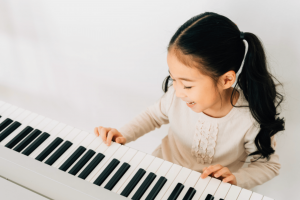
Get a piano or keyboard for your home.
Having a piano or keyboard accessible at home is crucial. This allows your child to practice regularly, reinforcing the skills and pieces learned during lessons.
Make sure you have the piano stool at the right height.
The piano stool needs to be set at the correct height. This is vital for promoting proper posture, which in turn leads to a more effective technique and prevents strain. Consider placing a foot stool underneath the piano bench or a cushion on top for small players.
Focus on accuracy instead of speed.
Emphasize to your child the importance of precision over pace. Mastering pieces accurately, even if slowly, lays a solid foundation for advanced techniques and more complex pieces in the future. Accuracy will also build confidence and musicality.
Have a routine for practicing.
Establish a daily practice routine to help build discipline and consistency. Set aside a specific time each day for practice to create a regular rhythm that encourages steady progress and helps ingrain musical concepts.
Play live music in person with other students.
Participating in recitals and group performances encourages a sense of community and achievement. Performing in front of others boosts confidence, provides goals to work toward, and showcases the results of hard work and practice.
When To Start Piano Lessons: Frequently Asked Questions
What is the best age to start playing piano?
The best age to start playing piano is typically around 5 to 9 years old, as children in this age group typically have the necessary physical, cognitive, and emotional development to begin formal training.
Can a four-year-old take piano lessons?
A four-year-old could take piano lessons, but it is important to assess their readiness level. If they show signs of readiness, such as interest in music, basic motor skills, and the ability to focus for short periods. Check out our list of readiness signs above for a full diagnostic of your child’s readiness to start piano lessons.
Does age matter in learning piano?
While starting at a young age can be beneficial, age does not preclude learning the piano. Adults and children alike can start learning at any age with the right approach and mindset.
Is seven too late to start learning piano?
Seven is not too late to start learning piano. Children of this age are often well-prepared to start lessons, showing the necessary physical, cognitive, and focus skills required for piano study.
Is Your Child Ready to Start Piano Lessons?
Come join us at Chambers Music Studio! Enroll your child in our piano lessons.
If you’ve been inspired by the thought of your child developing cognitive skills, discipline, and a love for music through piano lessons, consider making Chambers Music Studio part of your journey.
Our approach is tailored to encourage not just musical proficiency but also joy, confidence, and creativity. Start this fulfilling musical adventure with us today!
